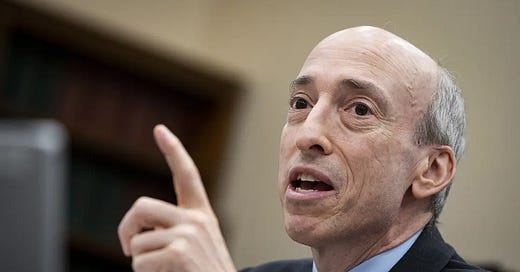For far too long, I have been chronicling the twisted machinations, wickedness, and malevolent motives of Gary Gensler, a man who has yet to prove me wrong. True to his word, on that fateful day of April 18th, during a congressional hearing, Senator Warren Davidson unveiled the SEC Stabilization Act, a bold move aimed at restructuring the Securities and Exchange Commission (SEC). Davidson minced no words when he declared, "US capital markets must be protected from a tyrannical Chairman, including the current one. It's time for real reform and to fire Gary Gensler as Chair of the SEC." Davidson found support in the vocal Senator Tom Emmers, who shares his conviction. However, removing Gensler from his position won't be a walk in the park. As a presidential appointee, his ousting is a formidable challenge. Both houses of Congress must come together to impeach him, a task made all the more daunting by the political differences that plague this matter. Nevertheless, there is a way to strike a blow against the SEC's rogue approach. Opponents can halt the annual funding of over $2 billion unless satisfactory changes are made to transform the agency into a non-political and corruption-free body.
Despite the obstacles that lie in the path of removing Gensler, Warren Davidson's move represents a step in the right direction. While it may not yield the desired outcome, it casts a spotlight on the atrocities committed by the SEC Chairman. A significant revelation came from Judge Sarah Netburn while presiding over the Ripple case. She remarked, "The SEC is adopting its litigation positions to further its desired goal, and not out of a faithful allegiance to the law." In the wake of the damning Hinman emails, how can anyone take the SEC seriously? The only way to bring the SEC down is through exposure.
Gary Gensler's hubris and arrogance have set the stage for the SEC's inevitable downfall. He is the proverbial fox guarding the henhouse, disregarding regulations, failing to establish clear rules, and fabricating narratives to suit his agenda. In my neck of the woods, we have a saying: "The fence eating the crops." Gensler must be stopped, and honest and mature leadership must be restored to the agency. The damage that one man can inflict upon a nation as vast as ours is immeasurable and unimaginable.
Gensler is a man of contradictions. While teaching crypto at MIT, he asserted that 75% of cryptocurrencies are commodities. Now, he claims that all cryptocurrencies, except Bitcoin, are securities. In 2021, he told Congress that there were regulatory gaps requiring clarity from lawmakers. Yet, today, he asserts that no such gaps exist. Recently, he even echoed the sentiments of Brad Sherman, suggesting that we don't need digital currencies since the dollar itself is already digital. Gensler executes a complete 180-degree turn on any issue that fails to align with his agenda. He fancies himself a law unto himself.
Gensler fully grasps the transformative power of cryptocurrencies and their potential to reshape the fourth industrial revolution. However, he operates with hidden agendas, preferring to work behind closed doors, ruling through arbitrary enforcement. On June 5th, the SEC unleashed lawsuits against Binance, the world's largest cryptocurrency exchange, and its founder, Changpeng Zhao (CZ). Coincidentally, the SEC followed suit the next day, targeting Coinbase, the largest digital asset exchange and listed company in the US. While these actions were highly publicized, their timing, just before the release of the Hinman emails, raised eyebrows. Rumors surrounding Binance had been circulating for months, with the Department of Justice also filing a lawsuit against the exchange. Binance may indeed have violated certain rules and should be held accountable for any wrongdoing. However, the SEC's request to freeze all Binance assets and customer accounts worldwide, under the pretext of customer protection, seemed excessive. Binance was willing to cooperate and provide the SEC access to its US operations, but the SEC adamantly refused. Eventually, the presiding judge dismissed the SEC's request. While Binance may need to address certain gray areas, they are prepared to fight tooth and nail against the SEC, boasting the resources to hire top-notch lawyers, much like Ripple.
On the other hand, the Coinbase case presents a different scenario. As a listed company, Coinbase diligently fulfilled all regulatory requirements before going public. In 2022 alone, they sought guidance from the SEC on 30 occasions, only to face silence, pushback, and ambiguity. Coinbase, too, will vigorously challenge the SEC. Even venture capital powerhouse Andreessen Horowitz took the initiative of drafting a regulatory framework as a starting point for discussions with the SEC, but to no avail.
Promethium may not be a familiar name to most readers, but in Greek mythology, Prometheus was the god who brought fire to humanity. Promethium, in Gensler's mind, was the Trojan horse designed to undermine the crypto markets. In the days to come, we will hear more about this scheme. Every action taken by Gensler seems to be a self-sabotaging endeavor. Watch the attached congressional hearing to witness the unfolding drama.
What's particularly perplexing is that not all industry players have been met with the same dismissive behavior. Curiously, the head of the Commodity Futures Trading Commission (CFTC) met with the now-infamous Sam Bankman-Fried (SBF), CEO of the centralized digital asset exchange FTX, a staggering ten times leading up to FTX's collapse. Furthermore, Gensler himself met with SBF twice in the six months preceding the collapse. Conversely, when the CEO of Coinbase, Brian Armstrong, attempted to meet with the SEC Chairman, he was repeatedly refused.
Now, it is common knowledge that SBF perpetrated one of the largest financial crimes in history. In due time, many details will be revealed to the public, or so we hope. In any democratic framework, there are typically three branches of government: the executive, legislative, and judicial. These branches are intended to operate independently. While the executive and legislative branches may falter due to hidden agendas and political differences, the judicial branch serves as a last bastion of hope. The American public still maintains faith in the US judicial system.
The Ripple case extends far beyond Ripple itself. It could potentially become one of the most significant cases ever presided over by Judge Torres. She is meticulously examining the case from all angles, taking her time. Nevertheless, her ruling could be delivered at any moment, even today. With the revelation of the Hinman emails, it is highly probable that Ripple will emerge victorious or, at worst, receive a 70 to 30 percent decision in their favor. This case holds many surprises, and there will undoubtedly be more lawsuits and countersuits. "Ethgate" is real, and the revelations stemming from this case will shock us all. Geo-political issues may also be at play, making this saga potentially even more significant than Watergate. Don't miss the captivating short animated clip produced by Oskar Arnarson, attached for your viewing pleasure.
Despite the prevailing sense of gloom and doom, industry organizations such as the Chamber of Digital Commerce and the Blockchain Association have undertaken remarkable efforts to engage regulators and policymakers. Additionally, thousands of investors and industry executives have dedicated themselves to the same cause. However, despite these endeavors, billions of dollars in investments and countless job opportunities have migrated out of the United States in recent years. The lack of regulatory clarity posed an enormous risk for businesses, prompting them to seek more favorable environments elsewhere. It is undoubtedly the darkest hour for digital assets in the US, but as the saying goes, it is always darkest before dawn.
Where the industry has struggled to make headway with regulators, it has made significant progress with policymakers and members of the US Congress in the recent past. We owe much of this progress to the power of social media and the collective efforts of those who refuse to tolerate injustice and strive for truth to prevail.
The Ripple case extends beyond the Ripple company itself. It has the potential to be the most significant case Judge Torres has ever presided over, prompting her to carefully consider all angles. While her ruling may come at any moment, the impact of the Hinman emails suggests a favorable outcome for Ripple, with an outright victory or a decision favoring them by a substantial margin. This case holds even more surprises and revelations, with the potential to shake the foundations of the financial world. In fact, it may prove to be an event of greater significance than Watergate. To get a glimpse of the unfolding drama, I highly recommend watching this brilliant short animated clip produced by Oskar Arnarson.
https://twitter.com/oskararnarson/status/1669313166579318790?s=48&t=O6MA_zkmOk3GMRB0R2W7Gg
Amidst the prevailing challenges, industry organizations such as the Chamber of Digital Commerce and the Blockchain Association have played a commendable role in engaging regulators and shaping policy. Countless investors and executives have joined forces in this endeavor. However, the departure of billions of dollars in investments and the loss of numerous jobs serve as a stark reminder of the pressing need for regulatory clarity. With 33 countries already establishing comprehensive rules for the industry, it is easy to understand why businesses are opting to relocate elsewhere.
While the current state of affairs may appear bleak, we must not lose hope. History has shown that from the darkest moments, new opportunities and transformative changes often arise. The industry may have encountered setbacks in its dealings with regulators, but progress has been made in engaging policymakers and lawmakers. The collective efforts of those who champion justice and truth are driving the industry forward, even in the face of adversity.
https://twitter.com/alexandergrieve/status/1668764481252478979?s=48&t=O6MA_zkmOk3GMRB0R2W7Gg
If you received value from this post, and you’d like to send some back, or if you’d like to signal to me to continue spending time on these types of explorations, feel free to buy me coffees (thank you!):
So, there we go. Thanks for reading Breezy Briefings. If you enjoyed this, I'd really appreciate it if you could take a second and tell a friend. Honestly. It makes such a big difference.
Forward this email. Recommend the newsletter. Share on Twitter, WhatsApp, Telegram, LinkedIn, Slack, wherever!
Join Breezy Briefings’ Official Telegram Channel: https://t.me/BreezyBriefings
Abraham George is a seasoned investment manager with more than 40 years of experience in trading & investment and multi-billion dollar portfolio management spanning diverse environments like banks (HSBC, ADCB), sovereign wealth fund (ADIA), a royal family office, and a hedge fund.



